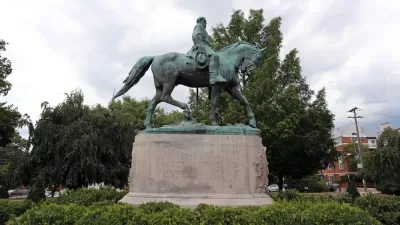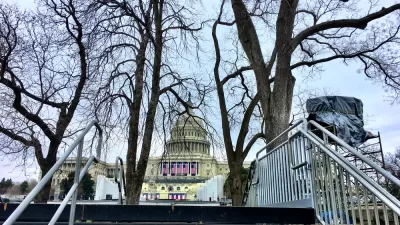A new study shows that these groups exist in around 10 percent of counties, and those counties are scattered across all 50 states.
At CityLab, Richard Florida dissects a new study on the geography of hate groups from researchers at the University of Utah.
"The geography of organized hate in America is at once significantly concentrated and considerably spread out. On the one hand, hate groups are found in slightly more than 10 percent of U.S. counties (340 of 3,142), according to the study. But on the other, hate groups span the entire country, and can be found in every single state. While the heartland—stretching from the Dakotas, Minnesota, and Nebraska to Iowa, Kansas, Missouri, Arkansas, Oklahoma, and Texas—has among the highest levels of hate groups, the East and West Coasts have a high density of these groups as well."
The study produced maps that illustrate not only the location of these counties, but how race, poverty, religion, and political conservatism correlate. And although there are hate groups in every state, those correlations vary significantly by region.
An article Florida wrote nearly seven years ago noted the number of hate groups was up 50 percent over the year 2000; according to the Southern Poverty Law Center, there has been a significant increase in the short time that Donald Trump has been president.
Planetizen has published several articles by Jason Reese about the implications of the rise in white nationalism for planning, and more specifically its influence on fair housing.
FULL STORY: Where Hate Groups Are Concentrated in the U.S.

Alabama: Trump Terminates Settlements for Black Communities Harmed By Raw Sewage
Trump deemed the landmark civil rights agreement “illegal DEI and environmental justice policy.”

Study: Maui’s Plan to Convert Vacation Rentals to Long-Term Housing Could Cause Nearly $1 Billion Economic Loss
The plan would reduce visitor accommodation by 25% resulting in 1,900 jobs lost.

Planetizen Federal Action Tracker
A weekly monitor of how Trump’s orders and actions are impacting planners and planning in America.

Waymo Gets Permission to Map SF’s Market Street
If allowed to operate on the traffic-restricted street, Waymo’s autonomous taxis would have a leg up over ride-hailing competitors — and counter the city’s efforts to grow bike and pedestrian on the thoroughfare.

Parklet Symposium Highlights the Success of Shared Spaces
Parklets got a boost during the Covid-19 pandemic, when the concept was translated to outdoor dining programs that offered restaurants a lifeline during the shutdown.

Federal Homelessness Agency Places Entire Staff on Leave
The U.S. Interagency Council on Homelessness is the only federal agency dedicated to preventing and ending homelessness.
Urban Design for Planners 1: Software Tools
This six-course series explores essential urban design concepts using open source software and equips planners with the tools they need to participate fully in the urban design process.
Planning for Universal Design
Learn the tools for implementing Universal Design in planning regulations.
Caltrans
Smith Gee Studio
Institute for Housing and Urban Development Studies (IHS)
City of Grandview
Harvard GSD Executive Education
Toledo-Lucas County Plan Commissions
Salt Lake City
NYU Wagner Graduate School of Public Service





























